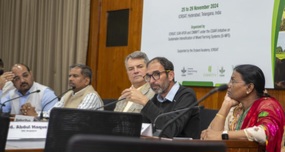Twenty-three agricultural scientists from six countries in Asia and Africa received training in advanced modeling tools from the International Crops Research Institute for the Semi-Arid Tropics (ICRISAT). This initiative is part of the CGIAR Initiative on Sustainable Intensification of Mixed Farming Systems (SI-MFS).
Participants from India, Nepal, Bangladesh, Laos, Malawi, and Zimbabwe attended a hands-on workshop at the ICRISAT Headquarters last week.
The workshop aimed to advance the sustainable intensification of mixed farming systems by adopting a systems-thinking approach. It integrated environmental, economic, and social dimensions into bundled solutions using tools such as Crop-Livestock Enterprise Modeling (CLEM) and Farm Design.
These tools facilitate the evaluation of solutions, analysis of trade-offs and synergies, and support for resilient, inclusive, and profitable smallholder farming.
Dr. Santiago Lopez Ridaura, co-lead of the CGIAR’s SI-MFS, highlighted the complexity of small-scale farms, which often include a mix of crops, intercrops, livestock, and both on-farm and off-farm enterprises. He emphasized the importance of interdisciplinary approaches to understanding system dynamics and trade-offs.
“This is the kind of collaboration we aim for in the CGIAR. Our greatest success comes when national institutes adopt these new tools in their work,” Dr. Ridaura noted.
The workshop was conducted in partnership with the ICAR-Indian Institute of Farming Systems Research (IIFSR) and the International Maize and Wheat Improvement Centre (CIMMYT).
Dr. Sunil Kumar, Director of ICAR-IIFSR, highlighted India’s progress in developing 75 prototype models for different zones and emphasized bridging the gap between research and field application while aligning with policies.
“Scaling solutions requires understanding on-the-ground constraints and strong policy support,” Dr. Kumar said.
Dr. Stanford Blade, Director General-Interim and Deputy Director General-Research at ICRISAT, stressed the need for balanced interventions.
“A single intervention can sometimes inadvertently disrupt other parts of the system. Systems tools are essential for analyzing trade-offs and achieving sustainable, balanced solutions,” Dr. Blade explained.
(IANS)














